
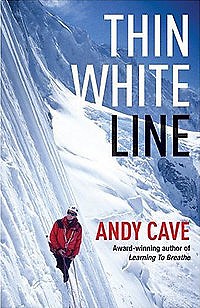
He is a qualified UIAGM mountain guide and author of two books; Learning to Breathe, which received the prize for best Adventure travel book at the 2005 Banff Mountain Book Festival, and the sequel Thin White Line that was published in early 2008 and contains more climbing memoirs.
Aged just 20, Andy became one of the youngest mountaineers at that time to climb the infamous North Face of the Eiger, an achievement made all the more remarkable as just 4 years earlier Andy was working 3000 feet underground at Grimethorpe Colliery in South Yorkshire. Also significant was a repeat of Divine Providence, one of the most difficult Alpine routes at the time. Aged 21, Andy cashed in his miners' pension and went to Asia for five months with Joe Simpson, beginning his quest to seek out new routes and dedicate his life to mountaineering.
Andy made the first ascent of the North Face of Changabang in the Garwhal Himalaya of India with Brendan Murphy. Unfortunately Murphy was hit by an avalanche and swept off the face to his death on the descent.
Along with Sir Chris Bonington, Andy is a patron of The Jonathan Conville Memorial Trust (JCMT). The JCMT was created in 1982 in memory of Jonathan Conville, who died in 1979 during a winter ascent of the Matterhorn. The Trust's aims are to encourage and assist individuals to train for and pursue outdoor adventure in the spirit that Jonathan followed during his life.
- More details about the The Jonathan Conville Memorial Trust at The BMC Website
Andy On Tour
Andy is also on tour this autumn, bringing his best-selling book Learning to Breathe alive with a series of lectures at 13 venues around the UK. Details in this UKC Premier Post
In this article and interview Andy shares some thoughts for young alpinists.
Some Thoughts For Young Alpinists by Andy Cave
Like most young British climbers when I first went to the Alps I was a confident trad-rock climber and I'd done a few Scottish winter routes. But even with that experience it is still a big step up into the alpine world. There is much you can do before you leave home for your first alpine trip or if you are lucky, your first alpine season; preparation that is worth investing in.
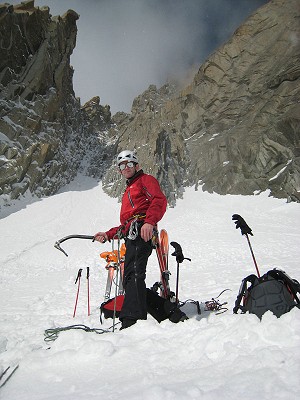
Get the info and get psyched: read the right books; ask the right people
Go to your local climbing shop and read every alpine guide book, until they kick you out. Better still, take a trip to your local library's mountaineering section. Spend time on alpine related internet sites, cramming your skull with giant north faces and twisting snow arêtes. At the climbing wall, find out which pub wise old alpinists frequent, and go along and ask them hundreds of questions, including: “Have you got any kit in the garage that you haven't used for donkeys?”. Read books by Bonington, Bonatti, Rebuffat, Boardman, Tasker et al and modern authors such as Joe Simpson, Stephen Venables, Simon Yates, Mark Twight, and Steve House. Glean any nuggets on how the masters survived in the icy alpine jungle.
Get a good partner!
Unless you are desperate to be famous or a bit of a loner, you'll need a climbing partner. Believe me, getting the right partner is probably the most important decision you will make. Resilience is key to alpine climbing, so someone who gets burnt out at the crag after two pitches is not ideal; neither is someone who gets terrified just two feet above a runner. Don't rule out those folk who can stay up really late abusing themselves and then miraculously manage to struggle up a strenuous crack the next day. Now you're talking the right stuff.
The right attitude is vital. When I reflect on my most enduring alpine partnerships, the common thread is a blend of courage and humility. You need courage to attempt a climb, but you don't want pretension. Being open with your feelings when up on a route can help build trust and helps the team to step outside the situation - to perform a reality check and ask; Are we still in control? Is the team still in good shape? Are we moving fast enough?
It's crucial that you share the same aspirations. If one person fancies a PD and the other an ED, then doing a TD+ just won't work. The more ambitious climber will be disappointed; the other so stretched and scared that they will be put off forever. If you can find someone more experienced (the right experience) then they could be a good mentor.
Always test drive a partner. Do a spot of cragging or, at least, choose a very easy alpine route to see if you are compatible. Does your potential partner have the essential alpine skills? The stamina to go uphill with a decent pack on; the ability to move steadily over medium difficulty and sometimes loose terrain, and have the mental strength and temperament to stay calm when things go wrong, or the unexpected happens?
If you find someone compatible, a good alpine partnership will grow and develop trust with each adventure.
Get fit
Compared to Scotland the Alps are big, but that's why you are going. Running for six weeks or so before you go can be helpful, not only physically but mentally as well. The more hills the better. 6-10 hour walks with a rucksack will be beneficial too. When you go trad climbing, set yourself a target, say 15 pitches in a day.
Learn how to save time; most time is wasted setting up belays or re-organising the rack. Train by climbing with a pack on. Do some climbing in big boots, at night, with a head torch, wearing gloves, after 15 pints, (ok maybe skip the pub, but you get the idea). Try to imagine all the unfamiliar and potentially negative things that you are going to come across on an alpine route, and prepare for them.
Get the right kit!
Find the best outdoor shop and ask for the alpinist. Get the right boots. Make everything else as light as possible and get a smaller rucksack. Even for the Eiger north face 50 litres is going to be more than enough. For many day routes 35 litres will suffice. Inspect each other's kit before setting off and be openly critical.
Homework!
There are many skills you will need once you are out in the Alps, here are a few important ones.
You might read up on some of this stuff before you leave - at the least check out the BMC Alpine Essentials DVD.
- Learn how to acclimatise.
- Learn about alpine weather.
- Set off early, and try and keep to guidebook times.
- Develop impeccable footwork when wearing crampons.
- Know how to shorten ropes so that you can move together on appropriate terrain.
- Use the rope to travel safely on glaciers. Practise crevasse rescue.
- Get good at route finding. Learn to memorise photo diagrams and route descriptions.
- Don't be afraid to turn back.
- Learn how to do multiple abseils during bad weather.
- Always check fixed protection and belays. Back up if unsure.
The Last Word
Hopefully you and your partner will learn lots, have fun and have a store of lifelong memories from your alpine adventures. And you will eagerly plan the next trip. Making small mistakes is part of the game – try avoid making big ones - but it is vital to learn from those small mistakes.
Bear in mind there is more to life than Chamonix. Maybe try Arolla or Saas Fe for your first season. The alpine world is your oyster. Ever heard of the Vorderspitze? Monte Disgrazia? The Fusshorn? The Portjengrat... Google them.
Enjoy your alpine climbing.
Interview with Andy Cave by Mick Ryan
Mick: Who are your climbing heroes?
Andy: Andy Parkin is something of a legend and I dedicated Thin White Line to both him and Mick Fowler. Alpinism is safe in their hands. That desire for the unknown is something shared by all alpinists, but these guys take it to such high levels. Andy is known more for his art than his climbing. He is probably one of the greatest alpinists that Britain has ever had. I can't think of anyone with an alpine new route CV like his.
Simon Nadin is the most naturally gifted climber I have ever climbed with, on-sighting 8a+ in 1990 like he was opening a tin of beans. Also, Britain's only world champion competition climber.
Mick: Who was your first alpine partner and what did you climb with them?
Andy: I broke my leg on my very first alpine route in 1984, so I don't count that. In 1985 I did half a dozen routes, Les Courtes north face being the biggest with a lad John McKeever. In 1986, Trevor Pilling and I repeated the Jori Badill on the Central Pillar of Freney (2nd or 3rd ascent). A preposterous early alpine route and my first time up Mont Blanc. It is now graded ED 2/3! In the photos I look about 12 years old. Trev had a big influence on me, a mentor who told me right away I had a big future in this game.
Mick: What kind of mistakes have you made when alpine climbing?
Andy: Setting off on big committing routes with people I didn't know well enough. Descending too late off the courtes. Not roping up on glaciers. Not putting enough glacier cream on. Soloing in winter as a young man, cos I thought it was big and clever, now I know it is daft and soft.
Mick: Can you describe some of the unexpected things that have happened to you whilst alpine climbing?
Andy: On the bivvy of Divine Providence, sleeping in a plastic bivvy bag, it started to snow. That wasn't forecast. Fortunately it stopped and we finished the route. More recently at the top of the Hyper Couloir, on the Brouillard face of Mt Blanc, an unexpected storm came in near the top. Lesson learnt is take care on Italian side of Mt Blanc!
Mick: What food and drink do you take up the mountain?
Andy: I always enjoy a good meal on a bivi before setting off, pasta, parmesan, ham etc. For breakfast porridge with milk. On the climb fruit and nuts, cereal bars biscuits with fig and seeds. Tins of mackerel and couscous for evening meal on bivvy. I use gels occasionally. Soup, coffee, hot chocolate, herbal tea. My bad habit is that I can go for a long time without water. I should drink more. Werthers originals in my pockets – crucial.
Mick: Describe your typical rack and equipment for a mixed alpine route: gear, ropes, tools etc
Andy: I am a Lowe Alpine and Asolo sponsored athlete so my gear reflects that. I wear Lowe Alpine's Alpine Lite, Ninja Hoody, and Outer Limits Jacket (I was involved in the design of all these). Mountain boots; the Asolo Expert GV and Asolo Cholatse GV for more technical routes.
Abolokov threader and abseil tape.
Cams 1, 2, 3, nuts 2,4,6,8,10. 3 pegs, 4 ice screws, 4 slings, 6 draws.
For harder routes more ice screws if mainly ice or more rock stuff if more mixed.
DMM hardware rocks because it is so light, stupidly light!
I use Petzl Charlet Dart crampons, Petzl Charlet Black Ice crampons for classic routes and Petzl Charlet Quarks tools. I use Petzl headtorch and helmet.
Ropes 2 x 8.5, or for harder stuff 1 x 9.2 + 1 x 8.5, Generally Beal or Mammut.
Also, I always use my Lowe Alpine Unisex ATTACK MX 50+10 rucksack.
Mick: Are you a pragmatist or a pure alpine climber? Meaning does anything go or do you have limits to what you will actually do to succeed.
Andy: I am free climber, I don't do aid and I don't do fixed ropes. I don't carry bolts. If I take a rest, or a point of aid, I report it.
Mick: How does luck figure into an alpine ascent?
Andy: If luck helps you find a great partner, excellent. If luck means you find the route of your dreams in perfect condition, superb. But on the mountain you make a lot of the luck. Most accidents start with an error, being in the wrong place at the wrong time, or a loss of concentration. On big routes you need relentless mental energy in order to concentrate for long periods - up to 18 hours without a break for example, maybe four days on the trot.
Mick: What music reminds you of your alpine climbing?
Andy: In my lecture I am using Gary Numan Are Friends Electric for an Alpine Montage, it's '79 but I still heard it a lot in mid-80s. Reggae was pretty big with the 80s alpine binmen, Yates, Smith, Miller, Tinker at al.
Mick: What are the smells and colours of alpine climbing?
Andy: Black through blue to gold at dawn. The smell is of almond croissants and cool lager sat back in the valley afterwards.
Mick: What is the perfect alpine peak?
Andy: The Grande Jorrasses, north side, still makes the pulse quicken.
Mick: Describe the perfect alpine route. Shut your eyes and imagine.
Andy: It is remote, committing, hard and it has a beautiful untracked knife-edge arête that leads to the summit. Then we put the skis on and bounce though powder. At the bottom there is a perfect gritstone boulder. Behind that is a beach with a small bar, and on the beach... you get the idea.
Mick: What are your alpine dreams and do you have any nightmares?
Andy: Nightmares: Even now I give total respect to the mountains and I try to in still that in my clients. Cocky, gung-ho folk, or people that are not meticulous in their approach, have less chance of surviving. I still run through everything a hundred times in my head the night before. Dreams: to climb some harder stuff in wild areas with good mates. I know of a few places...
Mick: What does the next chapter of Andy Cave's life have in store?
Andy: I had a knee injury two years ago and I got into cycling as part of the rehab. Cycling was fun but technically rather dull. I enjoy it still, but it made me realise how much I love climbing. I love problem solving, all climbers do. I love the unknown, I love on-sighting.
The journey goes on and I am grateful for that, for my health and the great people I can share the mountains with. In February, Dave Hesleden and I put up some magnificent new routes in Norway. The quality of the climbing, the beauty of the landscape, the isolation, it was mind boggling. I have a few photos here on my desk of places I'd like to go one day...
Mick: Lastly, what's with all this sport climbing you have been doing recently?
Andy: I do a lot of climbing coaching and mentoring. I think it is important to have genuine enthusiasm for what you are teaching. I have done a lot of hard trad routes over the years and the ones I have got left to do are harder still. I decided to do some sport routes to sharpen everything up. Plus I haven't done a lot of redpointing really, I get bored pretty quickly. I climb 8a most years and this summer I did a classic whilst out guiding in Chamonix (after work). And I thought why not stick with this it and push the grade a bit? Having said that went and did Spiders Web on Sunday, how mental is that for E2!
Mick: How's it gone? Did you get your projects?
Andy: It's been a lot of fun and I hope to bag a couple more before the lecture tour starts and a busy time generally this autumn.
DATES & VENUES OF THE ANDY CAVE TOUR
For links to each venues box office to book online, please visit http://www.speakersfromtheedge.com/events/andy-cave-tour-autumn-09
Please note booking fees may apply with online bookings.
SEPTEMBER
Fri 25 Galeri CAERNARFON 01286 685222
Sat 26: Theatr Harlech: HARLECH 01766 780667
OCTOBER
Tues 6 : Middlesbrough Theatre : MIDDLESBROUGH 01642 81 51 81
Mon 12: Town Hall : LOUGHBOROUGH 01509 231 914
Wed 14: Borough Theatre : ABERGAVENNY 01873 850805
Tues 20: Epsom Playhouse : EPSOM 01372 742555
Wed 21 : Dearne Playhouse : BARNSLEY 01709 894128
Thurs 22: King George's Hall: BLACKBURN 0844 847 1664
Fri 23 : Theatr Mwldan : CARDIGAN 01239 621200
NOVEMBER
Wed 4 : Pavilion Theatre : RHYL 01745 330000
Fri 6 : Albert Halls : BOLTON 01204 334400
Fri 13 : Festival Theatre : PITLOCHRY 01796 484626
DECEMBER
Wed 2 : The Lowry : SALFORD 0870 787 5790

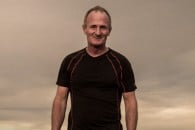

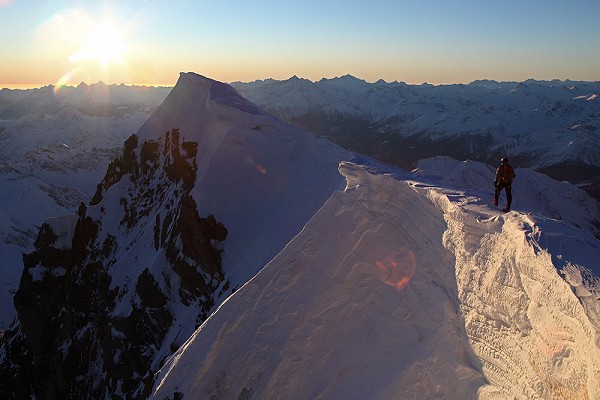
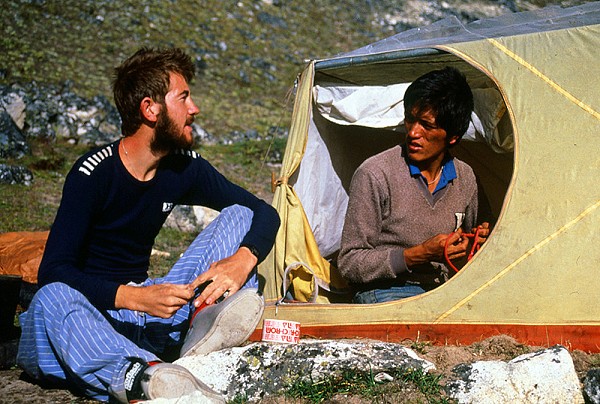













Comments